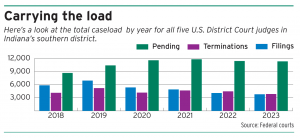Subscriber Benefit
As a subscriber you can listen to articles at work, in the car, or while you work out. Subscribe Now
When U.S. District Judge Jane Magnus-Stinson announced last year that she would be assuming senior status, it didn’t seem to most observers like it would take long to find a nominee to fill the seat on the federal bench in Indiana’s southern district.
Since Magnus-Stinson’s announcement, the U.S. Senate confirmed Indiana Northern District Judges Cristal Brisco and Gretchen Lund in January, filling two vacancies on that court.
Also, later that month, the Senate confirmed Judge Joshua Kolar to the 7th Circuit Court of Appeals.
It’s taken a little longer than expected for the Biden Administration to announce a nominee for the Indiana Southern District Court’s impending vacancy.
A statement released to Indiana Lawyer from a spokesperson in Indiana Sen. Todd Young’s office said that Young and Sen. Mike Braun publicly solicited applications for the Indiana Southern District Court vacancy and the deadline for those applications was April 30.

“While Judge Jane Magnus-Stinson’s seat is not yet vacant, the senators are reviewing applications and will evaluate how best to proceed in addressing the upcoming vacancy,” says the statement from Young’s office. “Additionally, during this Administration, Senators Young and Braun have helped fill two Seventh Circuit seats, one Southern District seat, and two Northern District seats. These numbers are notable, particularly as many blue state senators chose to keep their district court seats vacant during the entirety of the Trump administration.”
Both Young and Braun are Republicans and have shown a willingness to fill federal judge posts while a Democratic administration controls the White House and has the authority to name judicial nominees.
Carl Tobias, a University of Richmond School of Law professor, acknowledged that there had been momentum, particularly with Indiana’s federal nominees, in terms of being nominated and confirmed in a timely manner.
He said he wasn’t sure why there hadn’t been an announcement yet regarding a nominee to replace Magnus-Stinson on the bench.

“It’s an election year. Things traditionally slow down. But they didn’t have to,” Tobias said.
Tobias said Magnus-Stinson gave plenty of notice of her plans to assume senior status. The Indiana Southern District judge announced her intentions in August 2023.
Given that it is a presidential election year, with plenty of U.S. Senate seats also being contested, Tobias said it could be a long wait to fill the Southern District bench vacancy.
Filling judicial vacancies
Tobias said the Senate’s pace in confirming judicial nominees was pretty good last year and in the early part of 2024.
He said the Biden Administration had been producing enough nominees to help Senate Judiciary Committee Chairman Sen. Dick Durbin, D-Illinois, have people in the pipeline for confirmation tracks.
The White House announced May 8 the nominations of three federal district court judges and one circuit court judge.
 It was President Joe Biden’s 49th round of nominees for federal judicial positions, bringing the number of announced federal judicial nominees to 240 during his presidency.
It was President Joe Biden’s 49th round of nominees for federal judicial positions, bringing the number of announced federal judicial nominees to 240 during his presidency.
Tobias said he assumed the White House has been working with Young and Braun on filling the impending vacancy.
There are plenty of qualified magistrates, judges and U.S. attorneys that could be potential nominees for the Indiana Southern District judgeship, Tobias said, adding that there shouldn’t be any issues that would trouble Braun or Young.
Indiana’s federal courts, in terms of judicial vacancies, are in a better spot right now than a lot of other states. The state’s southern district is fully staffed with five judges, including Magnus-Stinson.
Tobias cited Missouri as one state that has three current vacancies, one additional impending vacancy and no nominees announced to fill the positions.

John Collins, an associate professor at George Washington University Law School, said he didn’t think there was any problem or underlying reason for not announcing a nominee for the Indiana Southern District judgeship.
He noted that Braun and Young have had a good working relationship with the White House, as far as advancing nominees and filling judicial vacancies.
Collins expects a nominee announcement soon, although he estimated it may not be before Magnus-Stinson officially takes senior status.
“I would think it would be filled before the November election,” Collins said.
There’s always an ebb and flow to the announcement of federal judicial nominees and the filling of vacancies on the district and circuit courts, Collins said.
Judgeship bill looks to add federal judges
In September 2023, Young announced that he and Sens. Chris Coons, D-Delaware), James Lankford, R-Oklahoma, and Alex Padilla, D-California, had reintroduced bipartisan legislation to address the judicial staffing emergencies occurring in district courts across America in a non-
partisan manner.
The Judicial Understaffing Delays Getting Emergencies Solved (JUDGES) Act would address these judicial shortages by increasing the number of federal district judges in the most overworked regions of the country, including the Southern District of Indiana, Young said.
“Too many Americans are being denied access to our justice system due to an overload of cases and a shortage of judges,” said Young in a news release at the time. “These judicial emergencies are affecting Indiana and a number of other states across the country. Our bipartisan bill will help address this shortage and ensure all Americans have the opportunity to have their day in court.”

Tobias said that proposed bill stemmed from a recommendation from the Judicial Conference of the United States that Congress to create 66 new district court judgeships, including one in the Southern District of Indiana, to help alleviate the federal judicial shortage.
The law professor said he heard in early May there is interest in passing the bill on both sides of the aisle in Congress.
The JUDGES Act would create the recommended judgeships after future presidential elections—– half on Jan. 21, 2025, and half on Jan. 21, 2029. It was first introduced in 2020 and reintroduced in 2021.
“The updated JUDGES Act includes changes as a result of another bill that passed the Senate by unanimous consent this year that made current temporary judgeships permanent,” Young’s spokesperson said in an email. “The JUDGES Act of 2024 no longer addresses temporary judgeships. Senator Young is excited about the additional cosponsors and will continue to work to get this legislation across the finish line.”
Collins said the judicial conference has been recommending for at least a decade that there be more judgeships created, but Congress has not passed legislation to do so.
Tobias said the COVID pandemic was a substantial reason caseloads went up in some judicial districts in recent years..
In Indiana’s Southern District, there were 2,268 pending cases listed for the 12-month period ending Dec. 31, 2023, according to the United States District Courts National Judicial Caseload Profile based on numbers for the 12-month period ending Dec. 31, 2023.
The district’s pending case numbers placed the court first within the 7th Circuit and seventh nationally in terms of caseloads.
There is also pressure on the federal judiciary in southern border states like Texas, New Mexico, Arizona and California, Tobias said.
“These districts have (judicial vacancy) needs that need to be filled,” Tobias said.
Collins said, overall, the Biden Administration has confirmed 194 federal judges.
During the same timeframe, there were 193 judges confirmed during former President Donald Trump’s single term, Collins said.
One thing that could slow the pace of confirmations this year is Sen. Joe Manchin’s pledge to oppose any federal judiciary nominees that are lacking support from at least one Republican senator from their home states.
“That shouldn’t be a problem for Indiana’s (Southern District) seat,” Collins said.•
Please enable JavaScript to view this content.

